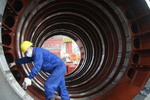Rare earth price plunge unlikely
Updated: 2011-08-09 09:35
(Xinhua)
|
|||||||||||
HOHHOT-- China's tight rare earth supplies will be an "irreversible trend" and prices will remain at high levels, a domestic entrepreneur said on Monday.
Zhang Zhong, general manager of Inner Mongolia Baotou Steel Rare-Earth Hi-Tech Co, the country's leading rare earth producer, made the remarks at the China Rare Earth Forum, held in the city of Baotou in north China's Inner Mongolia Autonomous Region.
Although rare earth prices have climbed to historic highs, the possibility of a price plunge is slim for the near future because of the tight supplies, Zhang said. "The era of cheap rare earths won't return."
Domestic prices of some rare earth products at the start of this month were as much as nine times compared with last year's levels, according to statistics from the company and Ganzhou Rare Earth Mineral Industry Co.
The skyrocketing prices sparked concern about a bubble. Ma Pengqi, a domestic rare earth scholar, said current rare earth price surges were abnormal and unsustainable. "There is defiantly a price bubble, and it might soon burst," he said.
However, Zhang refuted those remarks, saying that although speculation cannot be ruled out, "the fast rise of rare earth prices reflects its normal value."
Continuously surging demand for rare earths, boosted by the fast expansion of emerging industries, has outpaced supplies, leading to a supply strain on the global market, Zhang said.
He expects the global demand for rare earths to rise 5 to 8 percent annually in the coming years, while the annual growth of China's domestic consumption will be above 10 percent.
According to Zhang, a tight supply of China, the world's largest rare earth producer, also plays a role as the country continues its efforts to strengthen industry regulation of rare earths amid concerns of pollution and overexploitation.
Some major foreign rare earth mines have announced plans to boost output, but it still takes time for them to resume production, he said.
Zhang expects China to remain dominant in global rare earth supplies and pricing in 2013. "By the year of 2015, foreign rare earth mines might become followers of China's prices," he said.
China now produces more than 90 percent of the world's rare earth metals, which are widely used in the manufacture of an array of sophisticated products, including electric car batteries, wind turbines and aerospace alloys; however, China's rare earth reserves only account for about one third of the world's total.
To control environmental damage and protect resources, the country announced various policies, suspending the issuance of new licenses for rare earth prospecting and mining, imposing production caps and export quotas and announcing tougher environmental standards.
Related Stories
China to continue regulating rare earth mining industry 2011-08-08 16:38
Rare-earth output to be halted 2011-08-03 10:49
Rare earth companies to pass environmental checks 2011-07-29 13:47
Great Western, China firm to build rare earth plant 2011-07-26 10:28
- China, US plan to work together on product safety
- Rare earth producer H1 net profit surges
- Stocks dive amid US woes
- Passenger car sales hit bump in July
- Supply and marketing sector profit up 59% in H1
- China Vanke H1 net profit up 5.9%
- China's July inflation to exceed 6%:analysts
- China stocks close down 3.79%













